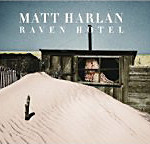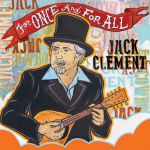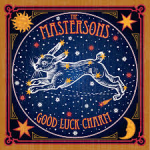It’s the time of year for “Best of 2014” lists, but we have nothing quite that definitive in mind here. Here’s a sampling of albums that impressed us over the past 12 months:
John Fullbright’s Songs
By Paul T. Mueller
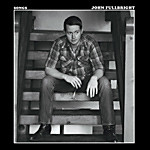 John Fullbright’s first studio album, From the Ground Up, made him a rising star in roots music circles two years ago. The singer-songwriter from Oklahoma probably could have gotten away with shaking things up the second time out. Instead, the recently released Songs is notable for its restraint. The 12 tracks are marked by clean production by Fullbright and Wes Sharon, with spare arrangements that leave plenty of space for Fullbright’s distinctive voice and lyrics.
John Fullbright’s first studio album, From the Ground Up, made him a rising star in roots music circles two years ago. The singer-songwriter from Oklahoma probably could have gotten away with shaking things up the second time out. Instead, the recently released Songs is notable for its restraint. The 12 tracks are marked by clean production by Fullbright and Wes Sharon, with spare arrangements that leave plenty of space for Fullbright’s distinctive voice and lyrics.
Relationships, good and bad, are at the heart of most of Fullbright’s songs. The album starts with the ironically titled “Happy,” a not-very-happy examination of the aftermath of a relationship that apparently didn’t work out so well. In “The One That Lives Too Far,” Fullbright acknowledges the difficulty of long-distance relationships, and “Until You Were Gone” tells the old, sad story of insight acquired too late – “I didn’t know I was in love with you/Until you were gone.”
Fullbright manages a more positive tone in “When You’re Near,” a cautiously optimistic tune that features some nice electric guitar by Terry “Buffalo” Ware. “I’m the one that you can go to/When you need another heartbeat near,” Fullbright sings in the chorus. “Don’t I feel like something when you’re here.” The album closes on an up note with “Very First Time” – “Between love everlasting/And meaningless rhyme/Sits feeling good for the very first time/I’m feeling good for the very first time.”
Fullbright has said he doesn’t understand why some people say his lyrics are vague, but such statements are clearly tongue in cheek. He is a writer who loves words, but he doesn’t always see the need to arrange them in straight lines. He fills his songs with images and metaphors whose meaning isn’t obvious at first glance, or maybe ever. Songs includes several examples of this, including “Write a Song,” a self-referential exercise that begins, “Write a song/Write a song about the very song you sing.” The cheerful “Going Home” starts out in a similar vein – “Bitter hearts from bitter ends/Crooked limps from crooked mends” – but also features the eminently quotable, “I met love. Love met me/And we agreed to disagree.”
The one song on Songs that’s really a narrative is “High Road,” a sweet but sad ballad about a farm couple and the disaster that eventually befalls them. It’s a quiet but powerful story.
Vague or clear, Fullbright’s songs work because he sings them with an imperfect but expressive voice and accompanies them with excellent guitar and even better piano (along with smaller doses of harmonica, drums and even whistling). He’s supported by a cast of fine musicians, including bassist David Leach (a member of his touring band, as is guitarist Ware), drummer Mike Meadows, organist Daniel Walker and steel guitarist Ryan Engleman. Co-producer Wes Sharon, who also recorded and mixed the album, is credited with bass on two tracks and percussion on one.
John Fullbright’s first studio album, From the Ground Up, made him a rising star in roots music circles two years ago. The singer-songwriter from Oklahoma probably could have gotten away with shaking things up the second time out. Instead, the recently released Songs is notable for its restraint. The 12 tracks are marked by clean production by Fullbright and Wes Sharon, with spare arrangements that leave plenty of space for Fullbright’s distinctive voice and lyrics.
Relationships, good and bad, are at the heart of most of Fullbright’s songs. The album starts with the ironically titled “Happy,” a not-very-happy examination of the aftermath of a relationship that apparently didn’t work out so well. In “The One That Lives Too Far,” Fullbright acknowledges the difficulty of long-distance relationships, and “Until You Were Gone” tells the old, sad story of insight acquired too late – “I didn’t know I was in love with you/Until you were gone.”
Fullbright manages a more positive tone in “When You’re Near,” a cautiously optimistic tune that features some nice electric guitar by Terry “Buffalo” Ware. “I’m the one that you can go to/When you need another heartbeat near,” Fullbright sings in the chorus. “Don’t I feel like something when you’re here.” The album closes on an up note with “Very First Time” – “Between love everlasting/And meaningless rhyme/Sits feeling good for the very first time/I’m feeling good for the very first time.”
Fullbright has said he doesn’t understand why some people say his lyrics are vague, but such statements are clearly tongue in cheek. He is a writer who loves words, but he doesn’t always see the need to arrange them in straight lines. He fills his songs with images and metaphors whose meaning isn’t obvious at first glance, or maybe ever. Songs includes several examples of this, including “Write a Song,” a self-referential exercise that begins, “Write a song/Write a song about the very song you sing.” The cheerful “Going Home” starts out in a similar vein – “Bitter hearts from bitter ends/Crooked limps from crooked mends” – but also features the eminently quotable, “I met love. Love met me/And we agreed to disagree.”
The one song on Songs that’s really a narrative is “High Road,” a sweet but sad ballad about a farm couple and the disaster that eventually befalls them. It’s a quiet but powerful story.
Vague or clear, Fullbright’s songs work because he sings them with an imperfect but expressive voice and accompanies them with excellent guitar and even better piano (along with smaller doses of harmonica, drums and even whistling). He’s supported by a cast of fine musicians, including bassist David Leach (a member of his touring band, as is guitarist Ware), drummer Mike Meadows, organist Daniel Walker and steel guitarist Ryan Engleman. Co-producer Wes Sharon, who also recorded and mixed the album, is credited with bass on two tracks and percussion on one.
Matt Harlan’s Raven Hotel
Houston-based singer-songwriter Matt Harlan isn’t one of those musicians who puts out an album every year – his last was released in early 2012 – but you can bet that when one does finally show up, it’s worth the wait. Raven Hotel is an excellent showcase for Harlan’s writing, playing, singing and production skills.
The album’s second track is titled “Half Developed Song,” but that may be a little inside humor (it’s actually about getting past everyday obstacles and getting on with life). There’s nothing half developed about any of Raven Hotel’s 12 songs. All are carefully written, skillfully played and sung. Clean production, for which Harlan and Rich Brotherton share credit, makes the most of them.
The title track deals with the struggle to maintain human connections in a busy world. “I’m living in my own world now, you can stop by if you like,” Harlan sings, “ ’Cause I’ll forget to call and I’ll forget to write.” Even more personal is the love-is-tough theme of “We Never Met (Time Machine).” “Well, it’s hard to be your lover, and it’s hard to be your friend,” goes the second verse. “When you don’t offer no forgiveness, it’s a game nobody wins.”
In “Second Gear,” a father’s instructions to his child during a driving lesson (“Drop it down another gear/The roads are slick this time of year”) turn into larger life lessons (“You’ll find a higher place that you can climb to/Just leave a trail to show them where you’ve been”). “Burgundy and Blue,” a sweet love song, marks a departure from Harlan’s usual folky style – it’s done as a jazz ballad, backed by the smoky tenor sax of John Mills.
Harlan’s wife, Rachel Jones, gets the vocal spotlight on “Riding with the Wind,” an ode to freedom that Harlan has said was written with her voice in mind. She also contributes nice harmony vocals on several other songs.
Other members of the all-star cast Harlan and Brotherton assembled for this project include Bukka Allen on organ, piano and accordion (the latter used to good effect on “Old Allen Road,” a dark tale of implied violence); Maddy Brotherton on violin; Floyd Domino on keyboards; Glenn Fukunaga on bass; Jon Greene on drums, and Mickey Raphael, best known for his long association with Willie Nelson, on harmonica, best heard on the wistful “Slow Moving Train.” Brotherton, who’s the longtime lead guitarist in Robert Earl Keen’s band, contributed on guitars and several other stringed instruments, as well as synth and vocals.
Paul Thorn’s Too Blessed to Be Stressed
By Ken Paulson
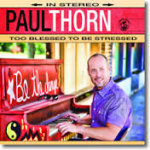 Paul Thorn’s Too Blessed to Be Stressed is sort of a children’s album for adults.
Paul Thorn’s Too Blessed to Be Stressed is sort of a children’s album for adults.
Just as kids’ albums teach cooperation, manners and personal hygiene in song, Thorn offers a few life lessons of his own:
- Remember that we’re “Too Blessed to Be Stressed.”
- Keep the faith and know that “Everything’s Gonna Be All Right.”
- Make friends because “Everybody Needs Somebody.”
- Walk a different path and “Don’t Let Nobody Rob You of Your Joy”
While that may sound preachy, it’s anything but. This is largely joyous and affirming music, supplemented with the vocals of the McCrary Sisters.
“Mediocrity is King,” the album’s highlight, is considerably more cutting. This is a contemporary protest song, bemoaning an era in which the shallow are celebrated, family businesses are obsolete and Johnny Cash would never have made it. In just 18 words, Thorn explains why our democracy is in disarray “When you don’t expect much, you’re never let down; you get the kind of government we’ve got now.” This is smart and pointed songwriting and we need a lot more of it.
The album isn’t wall-to wall messages. “I Backslide on Fridays” is more familiar Thorn fare, explaining how good intentions disappear over the course of a week.
Thorn and co-writer Billy Maddox have crafted a fine album with hook-laden songs that actually say something about the world we live in, a surprisingly rare achievement. Too Blessed to be Stressed continues Thorn’s remarkable run.
Parker Milsap
Oklahoma singer-songwriter Parker Millsap put together a very good debut with 2012’s Palisade. His self-titled sophomore effort, released earlier this year, is even better, demonstrating the kind of growth and perspective good songwriters acquire as they mature. It’s a little scary to think about where Millsap might be in a few years, given that he is now all of 21 years old.
For someone barely old enough to buy a legal drink, Millsap already possesses a phenomenal grasp of the art and craft of songwriting. Consider the album’s fourth track, “The Villain.” In its three verses (there’s no bridge), each constructed around a different theme, Millsap sings a gentle but profound apology and goodbye to a lover. “I don’t wanna be the missing piece of track anymore,” he sings in the final verse. “I don’t wanna be the guy/that straps you to a railroad tie/and listens for the rumble and the roar/I don’t wanna be/the villain in your dreams anymore.” The imagery is straight out of an old silent melodrama, but the emotional impact is immediate and intense.
Some of the album’s other songs – “Forgive Me,” “When I Leave,” “Yosemite” – work this quieter vein as well. But Millsap is equally good at letting it rip. His fuzzy electric guitar fuels “Truck Stop Gospel,” which seems to poke fun at evangelical Christianity – or does it? “I’m Paul the apostle preachin’ truck stop gospel/I’m not angry, no I’m not hostile,” Millsap sings, later adding, “Just wanna modify your behavior/I just want you to love my savior.” Sincerity or satire? You could argue it either way.
Some songs are better than others, but there isn’t a bad one in this collection. “Disappear” tells a sweet story of a young couple moving on to a fresh start (“Leave behind the things that never stood a chance/Like your mother’s good china and all our original plans”), while “Quite Contrary” and “At the Bar (Emerald City Blues)” relocate familiar characters (from nursery rhymes and Oz, respectively) to unexpected settings. The album’s closer, “Land of the Red Man,” is a joyous, resonator- and fiddle-soaked rave-up that takes some good-natured swipes at both Millsap’s native state and its rival to the south. “Maybe Oklahoma’s hotter than hell,” he wails, “but it’s better than Texas.”
Millsap’s performing style is compelling as well. His raspy voice, which makes him sound older than his years, is well suited to the stories and observations in his songs. For some listeners, the occasional yelps and yodels that punctuate his lyrics may take a little getting used to, but there’s no denying the absolute conviction with which he delivers everything from quiet ballads to all-out rockers.
Millsap is also a fine guitarist and harmonica player, and he has some excellent people helping him out here, starting with his touring band, fiddler Daniel Foulks and bassist Michael Rose (who also plays bowed saw). A couple of guys borrowed from fellow Oklahoman John Fullbright’s band make notable contributions – David Leach on trombone (he plays bass for Fullbright) and drummer Giovanni Carnuccio III on a few tracks (Millsap handles drums on the rest). Millsap and producer Wes Sharon also make effective use of a couple of other horn players, Eric Walschap on baritone sax and Marcus Spitz on trumpet.
Millsap was recently named one of five nominees for the Americana Music Association’s Emerging Act of the Year award. One listen to Parker Millsap will tell you why.
Jack Clement’s Once and For All
I spent my day Friday interviewing nine members of the Nashville Songwriters Hall of Fame as part of an archival project and one name came up again and again: Cowboy Jack Clement.
The producer, songwriter and occasional artist had a knack for identifying talented young songwriters and artists and nurturing them. In Memphis at Sun Records, in Beaumont, Texas, and finally in Nashville, Clement made friends, helped build careers and made great records.
That’s why it’s no surprise to see so many remarkable guests on For Once and For All, the final Clement album , released 11 months after his death in August 2013. Rodney Crowell, Vince Gill, Marty Stuart, Emmylou Harris, Bobby Bare, Duane Eddy, Dickie Lee, T- Bone Burnett, Buddy Miller, Dan Auerbach, Leon Russell, Gillian Welch, Dave Rawlings, Shawn Camp, John Prine, Dierks Bentley, Jim Rooney, Jim Lauderdale and Will Oldham are all on hand for this farewell album.
For Once and For All revisits 12 of Clement’s songs, a number of which were first recorded by Charley Pride. Clement and Pride broke down racial barriers in country music, and made some great records in the process. “Just Between You and Me,” “Got Leaving On Her Mind,” “Baby is Gone” and “I Know One” are among Pride’s best.
“Jesus Don’t Give Up on Me,’ with guitar by Duane Eddy, is the closest thing to a religious song on the record, but Peter Cooper sets the record straight in his liner notes: “Jack was about as religious as a corn cob, but he was a spiritual guy.”
“The Air Conditioner Song” is a reminder that keeping our windows sealed may make us more comfortable, but there’s beauty through an open window. Gill and Camp contribute background vocals and Joey Miskulin is on accordion.
It’s all quite an informal affair, with gentle instrumentation and Clement’s relaxed vocals.
I knew Jack just well enough to say hello, but I treasured every meeting. For Once and For All truly captures his spirit. Buy it for the joy.
Shovels and Ropes’ “Swimmin’ Time”
By Ken Paulson
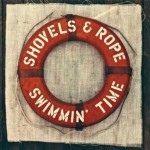 Shovels and Rope – Cary Ann Hearst and Michael Trent – have released a striking album that melds folk, country, blues and rock in a truly compelling style. Swimmin’ Time marries often rudimentary rhythms to fascinating narratives and compelling lyrics.
Shovels and Rope – Cary Ann Hearst and Michael Trent – have released a striking album that melds folk, country, blues and rock in a truly compelling style. Swimmin’ Time marries often rudimentary rhythms to fascinating narratives and compelling lyrics.
There’s a lot of water imagery here, including “Fish Assassin” possibly the most unsettling fishing song of all time.
“Mary Ann and One Eyed Dan” tells the saga of a waitress and a man who lost part of his eyelid in combat: “She said “Do you like the menu or do you need me to read it to you?’ Her question leaves him ” half way angry, half turned on and half confused.” It’s lousy math, but good songwriting.
Those kinds of lines jump out at you throughout the album. “I got wasted and sat around the fire all day, see if I could find someone to make love to,” Hearst sings on the plaintive album opener “The Devil is All Around.”
The music is still direct and basic, and often ominous, no surprise with song titles like “Evil” and “Bridge of Fire.” It’s a worthy follow-up to their highly successful debut.
The Mastersons’ Good Luck Charm
We first saw the Mastersons two years ago on a Cayamo cruise and were knocked out by their tight harmonies and penchant for great hooks.
Those traits show up in abundance on their second album Good Luck Charm on New West Records. Chris Masterson and Eleanor Whitmore, also members of Steve Earle’s Dukes and Duchesses, make for an impressive duo and their new album is even more fully realized than their first, Birds Fly South.
While not overtly political, the title track and “Uniform” make their points in highly melodic settings. “Closer to You” is a reminder to break down the barriers that keep us apart, a serious message delivered in an upbeat vessel.
There are songs of love and lost love, all with the engaging hooks and harmonies that drew us to the Mastersons in the first place.
Masterson and Whitmore have clearly committed themselves to releasing great sounding songs that say something. Mission accomplished.
Jesse Winchester’s A Reasonable Amount of Trouble
By Ken Paulson
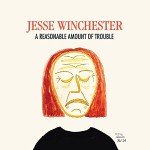 I braced myself for the first listening to Jesse Winchester’s A Reasonable Amount of Trouble. After all, this was his final album, recorded while he was dying of cancer. And the cover image of his painting of a crying woman was anything but upbeat.
I braced myself for the first listening to Jesse Winchester’s A Reasonable Amount of Trouble. After all, this was his final album, recorded while he was dying of cancer. And the cover image of his painting of a crying woman was anything but upbeat.
Who would have guessed such dour packaging would contain such a joyous album? With loving production from Mac McAnally, A Reasonable Amount of Trouble truly celebrates Winchester’s talent. Set for release on Sept. 16, the album features McAnally on guitar, Roscoe Beck on bass and Eric Darken on percussion, with guest turns by Jerry Douglas and Jim Horn.
Opener “All That We Have is Now” tells us to embrace the moment; it’s encouraging and lilting throughout. And then there’s the charming goofiness of “Never Forget to Boogie,” a bluesy shuffle and a pretty good way to live your life.
Winchester tapped into his childhood for three ‘60s-era hits, offering up sweet and fun covers of “Rhythm of the Rain,” “Devil or Angel” and “Whispering Bells.”
Closing out the album is “Just So Much,” a touching reflection on mortality and the most truthful song you’ll ever hear. Stunning.

